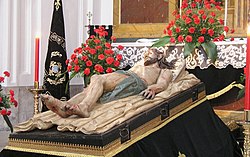Holy Saturday
| Holy Saturday | |
|---|---|

Statue of Jesus lying in the tomb by Gregorio Fernández. (Monastery of San Joaquín y Santa Ana, Valladolid)
|
|
| Official name | Holy Saturday |
| Also called | Easter Eve, Black Saturday |
| Observed by | Christians |
| Type | Religious |
| Significance | Marks the day Jesus Christ's body lay in the tomb and the Harrowing of Hell |
| Date | Day before Easter |
| 2016 date |
26 March (Western) 30 April (Eastern) |
| 2017 date |
15 April (Western) 15 April (Eastern) |
| 2018 date |
31 March (Western) 7 April (Eastern) |
| 2019 date |
20 April (Western) 27 April (Eastern) |
| Frequency | annual |
| Related to | Easter |
26 March (Western)
15 April (Western)
31 March (Western)
20 April (Western)
Holy Saturday (Latin: Sabbatum Sanctum), the Saturday of Holy Week, also known as the Great Sabbath, Black Saturday, or Easter Eve, and called "Joyous Saturday" or "the Saturday of Light" among Coptic Christians, is the day after Good Friday. It is the day before Easter and the last day of Holy Week in which Christians prepare for Easter. It commemorates the day that Jesus Christ's body lay in the tomb and the Harrowing of Hell.
Holy Saturday is sometimes referred to as Easter Saturday. Some authorities consider that usage incorrect, holding that the term is only correctly applied to the Saturday in Easter Week. However, using the term "Easter Saturday" to refer to the day between Good Friday and Easter Sunday is used in legislation in the Australian states of New South Wales and Queensland, and is in common use in Australia, including by government agencies.
On this day, the Blessed Virgin Mary as Our Lady of Sorrows is assigned the title Our Lady of Solitude, referring to her solace and grief at the death of her son Jesus.
In Roman Catholic churches, the chancel remains stripped completely bare (following the Mass on Maundy Thursday) while the administration of the sacraments is severely limited. Holy Communion, except for the Good Friday service, is given only as Viaticum to the dying. Baptism, Penance, and Anointing of the Sick may be administered because they, like Viaticum, are helpful to ensuring salvation for the dying.
...
Wikipedia
